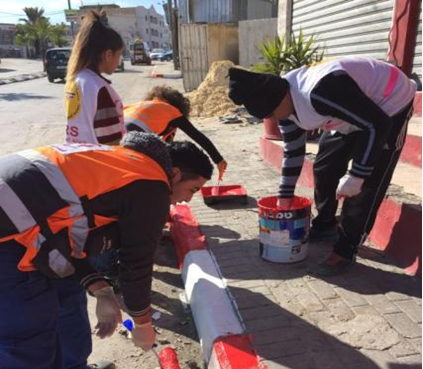PMRS volunteers paint the road sides in Al Ram’s main street to ease up traffic and increase safety. Photo: © PMRS
Access to health services in East Jerusalem is often blocked
The health situation is unstable in all of Palestine but in East Jerusalem it is more complicated than in other parts, because in emergencies Israeli emergency services are required by law to wait for police escort to enter some Palestinian neighborhoods in East Jerusalem. In addition to that, the Palestinian Red Crescent, which has only five ambulances, none of which has an ICU (intensive care unit) must obtain prior authorization from Israeli forces before intervening at any site in East Jerusalem. Most importantly, during times of tensions, entire Palestinian neighborhoods might be sealed off by police and thus, hindering the access of emergency health services for Palestinians living in East Jerusalem.
Training young people in first aid reduces the delay in receiving vital health care
Due to all these challenges and in hopes of increasing the preparedness of vulnerable communities in emergencies, around 1’500 young Palestinian men and women were trained in first aid and emergency preparedness in Jerusalem over the past 10 years. The Palestinian Medical Relief Society (PMRS) has been working on empowering young people to contribute to improving the access to emergency services to Palestinian people living in East Jerusalem until today. PMRS trained young people on first aid in 14 different communities in East Jerusalem to be able to intervene in emergencies until ambulances can enter the location. In addition, PMRS sets up different stations in eight locations across East Jerusalem to ease the work for volunteers. In order to train vulnerable communities on emergency services PMRS conducted first aid trainings and evacuation trainings for 54 different schools across the city.
The PMRS played a significant role in developing the capacity of young Palestinians in contributing to the improvement of access to emergency services in vulnerable communities in East Jerusalem.

Evacuation exercise in a school in Sur Baher. Photo: © PMRS
In addition to empowering young people to be able to contribute to their communities in emergencies through giving first aid, PMRS provides trainings for young people on other important topics such as gender, communication skills and environmental issues.
The organization provides a safe space for young people to be able to socialize and develop their skills. PMRS supports young people in conducting small initiatives to empower and mobilize their communities. All of these factors help, create a newfound purpose for young people, as well as a renewed sense of national and personal identity and pride.



